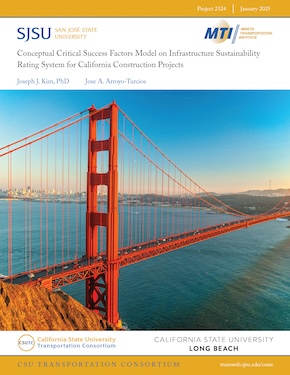- 408-924-7560
- mineta-institute@sjsu.edu
- Donate
Conceptual Critical Success Factors Model on Infrastructure Sustainability Rating System for California Construction Projects
This report addresses the sensitivity and reliability of the sustainability rating systems by comparing each category’s verified scores with its respective submitted scores to evaluate how points are awarded for infrastructure projects, examine which categories present the most challenges for verification, and identify the best category for verification in the sustainability rating system. The authors conducted three analyses using credit score data obtained from fourteen actual civil infrastructure projects certified under Envision. First, the Natural World category had the highest average score from the submitted and verified data. Pairwise comparisons using t-tests indicate that the mean value of one category does not differ statistically from that of other categories. Second, a one-way analysis of variance found no statistically significant differences among the five categories’ scores. Two-sample t-tests for comparing the submitted credit scores and the verified credit scores demonstrated no statistically significant difference in all five categories. However, the results showed that the verified credit scores are 18.63% lower than the submitted credit scores for all five categories. Third, multiple comparisons (Hsu’s MCB) showed that the Natural World category is the best category with 95% confidence. The results also indicated that the Quality of Life, Leadership, New World, and Climate and Risk categories have a higher possibility of being verified on a similar level, proving that those projects are close to the “best” category and present fewer challenges to be certified than the Resource Allocation category. The findings from this report will provide sustainability managers and project teams with insights into credit implementation in the pre-design stage of potential infrastructure projects that may pursue the certification process.
JOSEPH J KIM, PHD, PE
Dr. Kim is Professor and Department Chair of the Department of Civil Engineering and Construction Engineering Management at California State University, Long Beach. He was involved in supervising a graduate student assistant and was responsible for overall project coordination, ensuring successful project completion, and preparing the final MTI report. Prior to this research, Dr. Kim played an important role in a research project that evaluated several ITS-based treatments for the safety of a pedestrian crossing the streets funded by the Federal Highway Administration. He worked on the overall management of that project, which included the supervision of students collecting data based on either human or video observation, organization of data, statistical analysis using non-parametric tests, and reporting of the results. The outcomes have been featured in several publications and presentations at the meetings of the Transportation Research Record: Journal of the Transportation Research Board and the annual Transportation Research Board. Dr. Kim has previous experience as a GIS specialist at the Gainesville Police Department in Florida and has a minor in statistics, which is a significant advantage for conducting this research.
JOSE ALEJANDRO ARROYO
Jose is a civil engineering graduate student at the Department of Civil Engineering and Construction Engineering Management at California State University, Long Beach who contributed to accomplishing the goals of this research project. His interests within the field include transportation engineering and project management. The scope of his contributions includes assistance in the analysis of collected data with Dr. Kim and the preparation of the MTI report.
-
Contact Us
San José State University One Washington Square, San Jose, CA 95192 Phone: 408-924-7560 Email: mineta-institute@sjsu.edu






